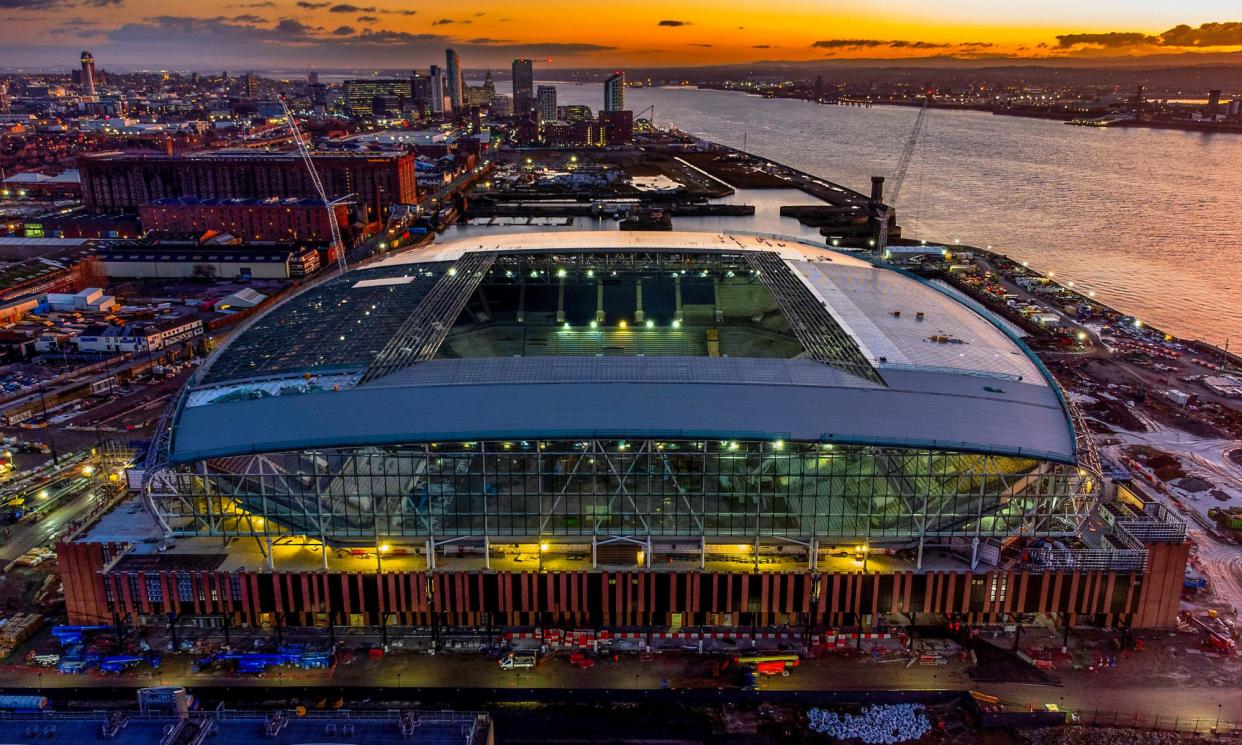The Everton crisis explained: how did it get to this point?

At Everton’s annual general meeting in January 2019, the owner, Farhad Moshiri, made a dramatic promise.
Speaking about the club’s ambition to build a 52,888-seat stadium at Bramley-Moore Dock, the club’s majority shareholder pledged: “I’ll throw as much money as needed. Private markets will provide £350m, naming rights will give us some more and we will maybe have an equity gap of £100m.”
Related: Everton call in insolvency advisers amid fresh doubt over 777 takeover
He added: “[This club] is sufficiently robust to see the project through. It is no luxury; we have to get it done. If we want to have a big club we need a modern stadium and we will get it”.
About 15 months ago, in January 2023, Moshiri was still reading from much the same script. He told Everton’s Fan Advisory Board: “The club is not for sale, but I have been talking to top investors of real quality to bridge a gap on the stadium. I can do it myself; the reason I want to do it is to bring top sport investors into Everton, for some of the reasons the fans want improvement: more talent. We are close to having a deal done.”
However, those studying the club’s operations at that point would have spotted the clues that have slowly led to Everton now calling in a leading firm of restructuring and insolvency advisers to help with their huge debts.
One of the earliest red flags came as a result of an announcement the club made a year after Moshiri’s pledge to “throw as much money as needed” at the stadium project. In January 2020 Everton made a show over what looked like a significant appointment, hiring the US investment bank JP Morgan and Japan’s largest bank, MUFG, to help raise the then £500m required to build the ground.
The pair are such stellar names in the world of finance that the partnership seemed like one of the most important signings of the season. But the relationship became an albatross to the club, as the combined efforts of those two huge financial institutions could not secure backing for the project in almost four years of trying.
Experts have told the Guardian that the usual method of financing new stadiums is to secure all the funds required before a shovel is thrust into the ground – even though clubs then typically refinance projects at a later date.
Without the comfort of that investment – and with previous well-known lenders including Santander and Industrial and Commercial Bank of China no longer providing loans to the club – Everton were left having to borrow from different sources to fund working capital requirements.
In September 2019 Everton opened an £80m “credit facility” with a company called Rights and Media Funding (RMF), a Cheshire-based firm with zero employees that borrows its funds from opaque offshore companies in order to lend to football clubs. The debt to RMF soon grew.
RMF is now the largest lender to Everton – owed about £225m on an interest rate understood to have reached 10.25%. That means that hundreds of thousands of pounds are flowing out of the club each week.
RMF has secured its loan by having rights to property around Goodison Park. It also has clauses in its agreement that are understood to have allowed it to veto a proposed takeover by the US sports investment group MSP Capital last year. Neither RMF nor MSP has previously commented to the Guardian on that point.
MSP itself – along with its partners, the Evertonian businessmen Andy Bell and George Downing – is another large creditor. That consortium has loaned the club about £160m, which is secured over the new stadium development, as well as a charge over more than half of Moshiri’s 94% stake in the club, according to corporate documents filed in the Isle of Man.
Finances are so tight at Goodison Park that MSP could have taken control of Moshiri’s shares – and therefore the club – last month, because the prospective buyer 777 Partners had failed to repay MSP on time as part of its takeover.
In the seven months it has been trying to complete its Everton takeover, 777 has itself loaned about £200m, just to keep Everton going.
That constant need for working capital injections – along with the size of the debt burden compared with Everton’s assets – is what is thought to be concerning club directors now.
When companies fall into financial difficulties, directors are required to take professional advice and closely monitor a business’s finances to ensure that they are not trading while insolvent.


